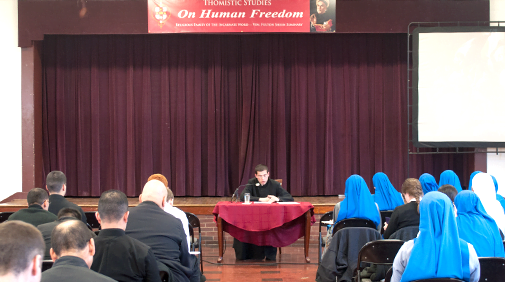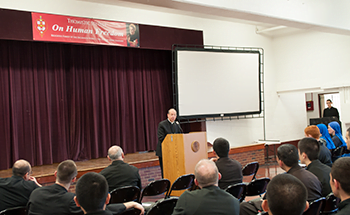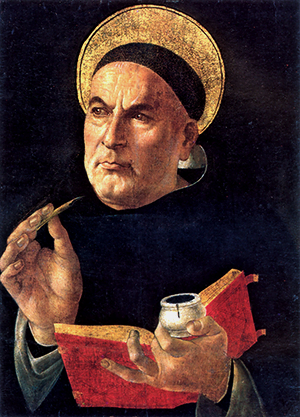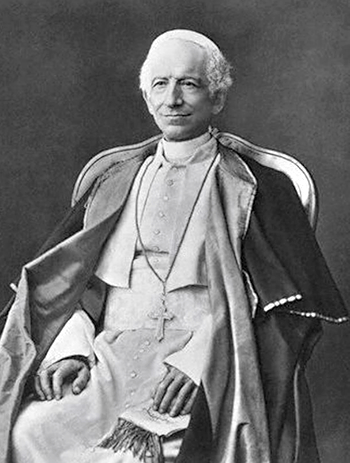
From March 8th-11th, the Ven. Fulton Sheen House of Formation hosted its annual Thomistic Studies week; this year’s topic was on human freedom. Seminarians and priests from the Institute of the Incarnate Word (IVE) as well as sisters from the Servants of the Lord and the Virgin of Matará (SSVM) gathered together for a series of presentations covering an extensive range of philosophers, each of which related in some way to the topic of freedom as defined by Saint Thomas Aquinas, the great “Angelic Doctor” of the Church. After the seminarians, priests, and sisters gave their presentations, all were graced with the presence of several guest speakers: Dr. Joseph Atkinson of the Pontifical John Paul II Institute, Fr. Mark Pilon of Christendom College, Fr. Thomas White, OP, of the Dominican House of Studies, and His Excellency the Most Rev. William E. Lori, Archbishop of Baltimore. The week closed with a Mass celebrated by His Excellency.

One may wonder in this day and age why a seminary would devote so much time and interest on one particular philosopher and theologian when there are so many others (even Doctors of the Church) from which one can choose to study. In explanation of why this is, we look to none other than Pope Leo XIII’s encyclical Aeterni Patris for guidance.
Pope Leo XIII reigned as pope from 1878 to 1903 (the third-longest pontificate in history) and is well known in the Church for his promotion of the scapular, the rosary, and his social doctrine encyclical, Rerum novarum. However, a lesser-known achievement of his is what the man’s successor Pope St. Pius X would call “chief” among them: namely, his restoration of the doctrine of St. Thomas Aquinas to its proper pride of place in the Church. Aeterni Patris, issued on August 4, 1879, helped to do just that.
Written during a time of great intellectual upheaval, when many of the natural sciences were challenging traditional understandings of physics and cosmology, Aeterni Patris tries to set the record straight in regard to the Church’s position on science. In the words of Leo XIII, philosophy “can only by the grossest injustice be accused of being opposed to the advance and development of natural science.” The scholastics, after all, said that the human intelligence is led to the knowledge of immaterial things “only by things sensible,” and readily understood that “nothing was of greater use to the philosopher than to diligently search into the mysteries of nature and to be devoted…to the study of physical things.”
Only in St. Thomas do we see that reason and faith are “clearly” distinguished. The Angelic Doctor “both preserved the rights and had regard for the dignity of each; so much so, indeed, that reason, borne on the wings of Thomas to its human height, can scarcely rise higher, while faith could scarcely expect more or stronger aids from reason than those which she has already obtained” through him.
A knowledge in Aquinas is also useful in correcting errors and defeating heresy. According to the German Protestant reformer Martin Bucer, “there were not lacking” among the leaders of the various Protestant groups “some who openly declared that, if the teaching of Thomas Aquinas were only taken away, they could easily battle with all Catholic teachers, gain the victory, and abolish the Church.”

It is said that one of the major benefits to reading St. Thomas is that you can learn from reading him in one year than all of the other church fathers combined. According to the Italian philosopher Thomas Cajetan, Aquinas is the “most venerated of the ancient doctors of the Church,” and “in a certain way seems to have inherited the intellect of [them] all.” A true scholar in the scholastic mold, St. Thomas’s “office” was – and is – to “bind together by the fastest chain human and divine science.” The Angelic Doctor “collected together and cemented, distributed in wonderful order, and so increased with important additions that he is rightly esteemed the special bulwark and glory of the Catholic faith.”
But the mere study of Thomism, particularly a Thomism that is heavily reliant on secondary sources, would be woefully inadequate and potentially dangerous. Pope Leo XIII exhorts: “Be watchful that the doctrine of Thomas be drawn from his own fountains,” and “be careful to guard the minds of youth…from strange and unwholesome streams.” A powerful case can be made that the errant strains of modern philosophy can be traced to overly adhering to sources of these “strange and unwholesome streams.”
The final reason why the study St. Thomas Aquinas is important is quite simply because the popes have mandated it. Popes all throughout the Church’s history – from the years immediately following Aquinas’s death all the way up until the age of Leo XIII (and into the twenty-first century!) – have not only praised St. Thomas’s teaching but have declared it authoritative. The list of popes preceding Leo XIII who have exhorted the faithful to study Thomas includes:
- Clement VI, In Ordine (bull), 14th century
- Nicholas V, Brief to the Friars of the Order of Preachers (1451)
- Benedict XIII, Pretiosus (bull), 18th century
- Pius V, Mirabilis (bull), 16th century
- Clement XII, Verbo Dei (bull), 18th century
- Urban V, Address to the Academy of Toulouse (August 3, 1368)
- Innocent XII, Letter to the University of Louvain (February 6, 1694)
- Benedict XIV, Letter to the Dionysian College of Granada (August 26, 1752)
- Innocent VI, reigning from 1352-1362, testified that “those who hold to [the teachings of St. Thomas Aquinas] are never found swerving from the path of truth, and he who dare assail [them] will always be suspected of error.”
- Pope Saint John Paul the Great, beloved co-patron of the Institute, called Saint Thomas “an authentic model for all who seek the truth” and “a master of thought and a model of the right way to do theology.”

In closing Aeterni Patris, Pope Leo XIII says, “We exhort you, venerable brethren, in all earnestness to restore the golden wisdom of St. Thomas, and to spread it far and wide for the defense and beauty of the Catholic faith, for the good of society, and for the advantage of all the sciences.”
Now that the week of Thomistic Studies has come to a close, let us continue to “follow the example of the Angelic Doctor, who never gave himself to reading or writing without first begging the blessing of God; who modestly confessed that whatever he knew he had acquired not so much from his own study and labor as by the divine gift. And therefore let us all…beseech God to send forth the spirit of knowledge and of understanding to the children of the Church, and open their senses for the understanding of wisdom.” And finally, “that we may receive fuller fruits of the divine goodness, [let us] offer up to God the most efficacious patronage of the Blessed Virgin Mary, who is called seat of wisdom.”
